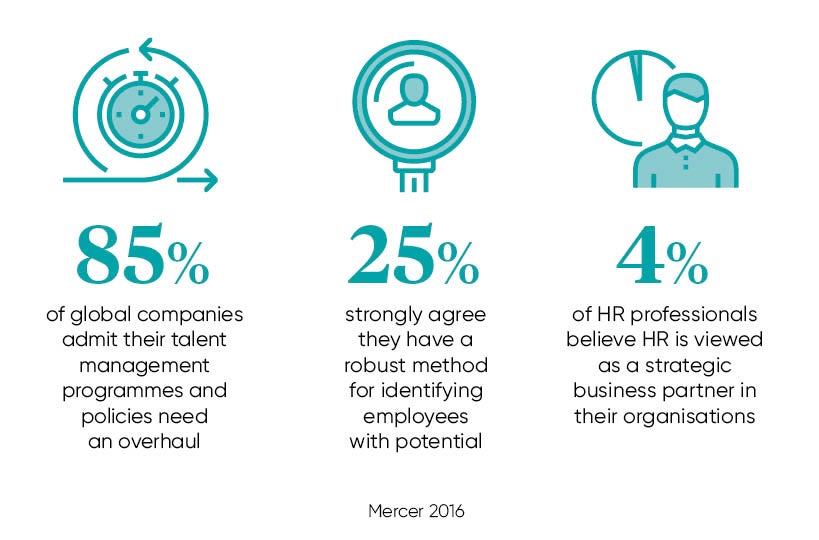More than eight in ten human resources leaders and employees believe their talent management strategies should be improved.
A staggering 85 per cent of respondents to the April 2016 Mercer study, Future-proofing HR: Bridging the gap between employers and employees, admit their talent management programmes and policies need an overhaul.
Further, although 75 per cent of employers claim to be working on creating diverse, inclusive leadership teams, only about half of all employees say their organisation has effective programmes to develop diverse leaders, according to the study, which polled more than 1,730 HR leaders and 4,500 employees across 15 countries.
This helps explain why one in three employees is planning to leave their current organisation within the next 12 months due to lack of career-progression opportunities.
Transforming HR
The HR function, which is responsible for people management, consequently needs an overhaul if the C-suite is ever going to prioritise, and take action around, talent management.
But there are a number of challenges to overcome as part of this overhaul, not least the view held by many C-suites that HR is little more than a cost centre to their business.
Just 4 per cent of HR professionals polled by Mercer believe that HR is viewed as a strategic business partner in their organisations.
This comes as little surprise to Chris Rowley, emeritus professor of human resource management at City University’s Cass Business School. He says: “Despite the common rhetoric that talent is integral to organisations and competitiveness, HR continues to struggle to have clout in the C-suite.
“On the one hand, there is the long-standing antipathy, even hostility, by many towards the HR function and the chief human resource officer’s (CHRO) position in the C-suite.
“On the other hand, there is the desire of HR to transform itself from its traditional reactive and administrative reporting model image towards being a more strategically integrated contributor to organisational performance. One route towards this is for CHROs to be involved in leadership succession plans and talent management. This can involve talent management in twin ways.”
The possibility that supply of labour may be limited by Brexit should be a key driver in motivating C-suites to take action on talent management
Strategic HR leaders make meaningful contributions to strategic debates around important issues such as talent management by becoming proficient in data analytics, because this enables them to arm their C-suite with the people data necessary to assess the current and future state of its workforce.
As Tamsin Sridhara, director at Willis Towers Watson, says: “If you’re in the finance function, you get that continual automated flow of finance data and if you’re in a retail product role you get that daily feed of product data. Why isn’t there the same amount of analytical information and the same amount of data available for people as there is for other functions?”
Professor Rowley agrees, suggesting HR could forge a path ahead for itself by building on HR information systems, and using big data to develop and produce pools of talent and pipelines of top-class internal candidates for senior roles in organisations.
“Of course, globalisation, internationalisation and cross-border M&A, and workforce demographic trends create greater diversity. That makes talent management more difficult to achieve and requires leaders with requisite skills to recognise this and manage such staff,” he says.

Engaging the C-suite
In addition to data analytics, HR professionals need to be able to talk the same language as the C-suite.
As Peter Cheese, chief executive of the Chartered Institute of Personnel and Development (CIPD), says: “What we’ve been saying for a while is that HR can’t speak the language of business, which largely lies in the language of numbers. But equally, the business doesn’t have the language of HR.”
He adds that the time has come for HR to step up and fulfil its potential. “The need for HR to engage with executive managers on big strategic debates has never been clearer. Look what’s happened this year. Brexit has triggered a lot more discussion, as it should, about what is the nature of our workforce today.”
The possibility that organisations’ ready supply of labour may be limited by Brexit should be a key driver in motivating C-suites to take action on talent management. This action should involve a review of their entire people strategies, from the approach to staff recruitment and retention to policies on pay and reward.
In his October 2016 paper, Shaping the world of work – time for a UK jobs strategy, Keith Sisson, emeritus professor of industrial relations at the University of Warwick, says businesses are preoccupied with low pay-based people strategies at the expense of productivity.
“Too many UK businesses, to put it bluntly, operate in the bargain basement, relying on low pay to survive. Work organisation is rooted in ‘lean’ and ‘traditional’ models with extensive managerial hierarchies and long hours, but little high-performance working,” he says.
This short-termism needs to stop or the consequences for UK plc could be disastrous.
“If business doesn’t start to manage people better [and apply] more fairness and more transparency about how they reward, then there will be more legislation, so I think this is a real time for business to step up,” CIPD’s Mr Cheese concludes.
Transforming HR

